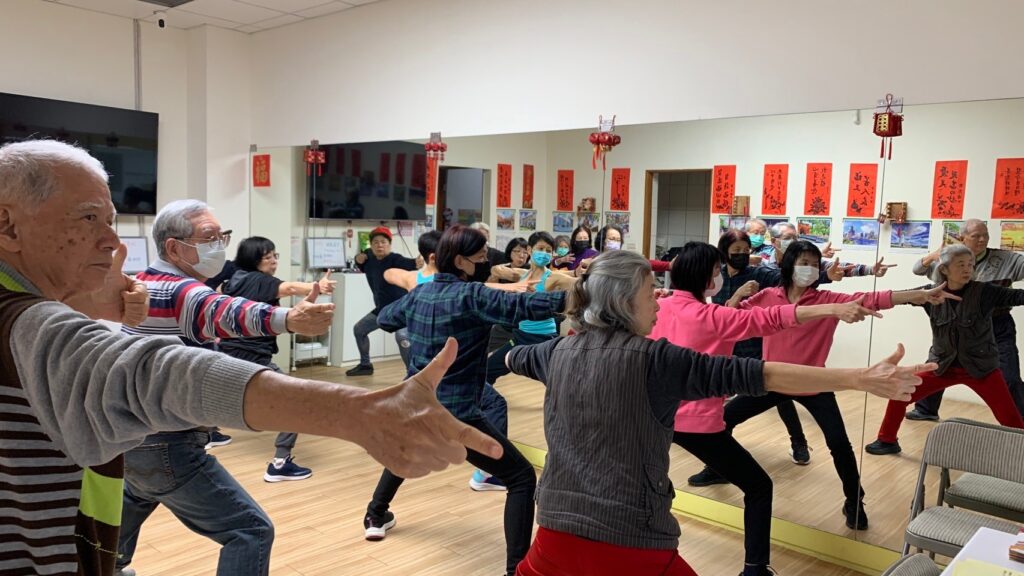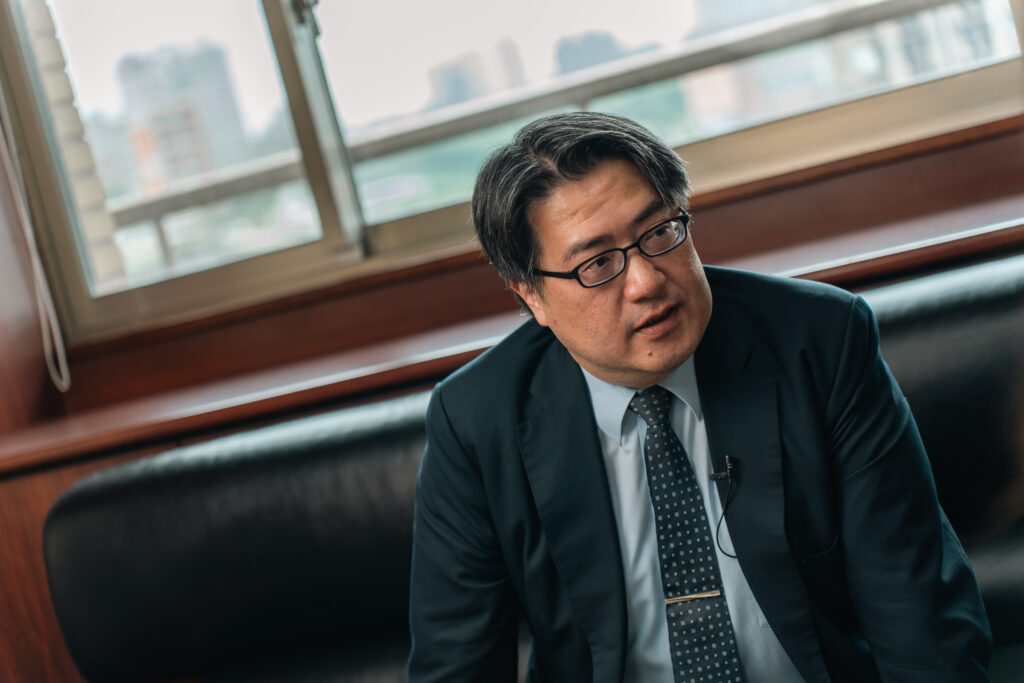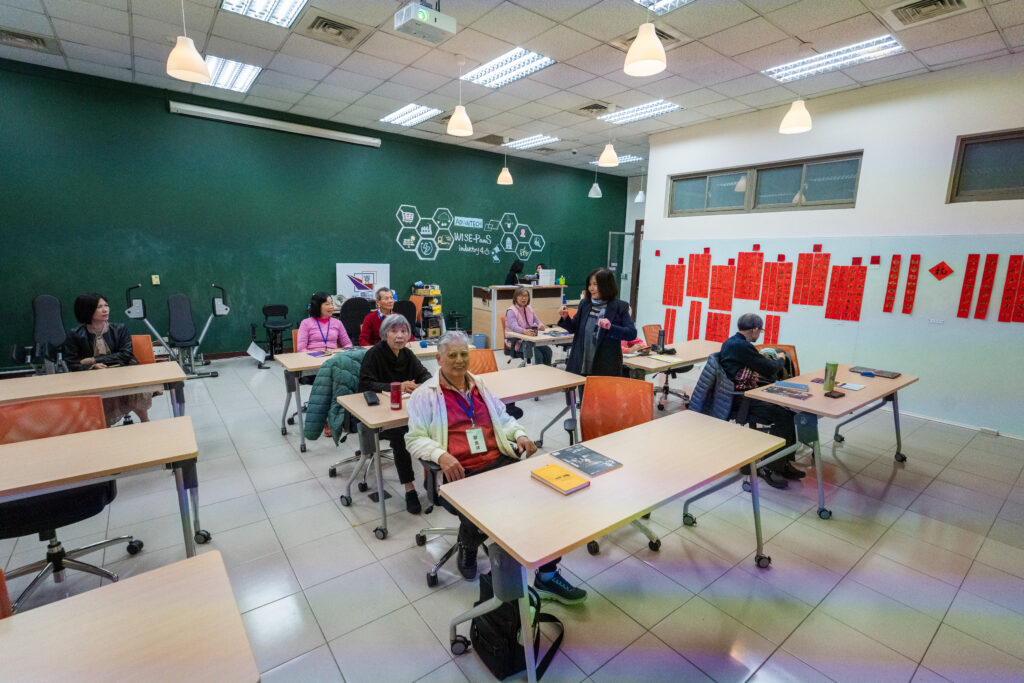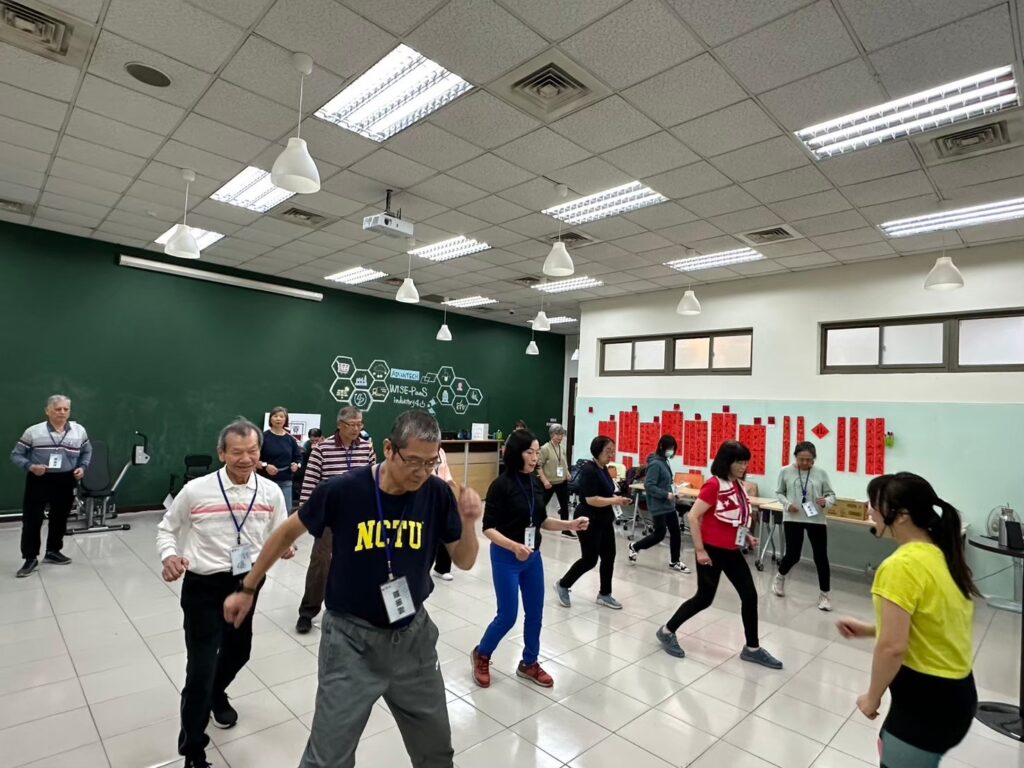▲Taipei Municipal Gan-Dau Hospital (Operated by Taipei Veterans General Hospital, TVGH) and National Yang Ming Chiao Tung University (NYCU) jointly established Gandaulogy Academy Dao Xiang for cognitive board game courses to provide body-mind-spirit care for the elderly.
According to statistics from the Ministry of the Interior, the older population aged 65 and above in Taiwan reached 19.1% in 2024. As of today, Taiwan, in 2025, has reached the threshold of the “super-aged society” as defined by the World Health Organization at the fastest pace in the world. Consequently, this will need to increase health and social care resources and exert transition pressure on community resilience, family support, and the overall social structure.
Facing this unprecedented demographic challenge, National Yang Ming Chiao Tung University (NYCU) has chosen to address it not only from a medical perspective but also through a multi-pronged approach encompassing education, design, technology, and community practice. NYCU has developed a response tailored to Taiwan’s context yet capable of being shared globally. Rather than merely proposing concepts, NYCU has translated these ideas into observable, replicable, and scalable models.
Gandaulogy Academy: Evidence-based community health paradigm
“Rather than having doctors talk until they’re blue in the face in the clinic, it’s better to find a way to get John Doe next door to ‘casually’ join in the activities, which is the real way to promote healthy aging, to prevent disability, and dementia process in the community,” Liang-Kung Chen, Superintendent of Taipei Municipal Guan-Du Hospital and Director of the Center for Healthy Longevity and Aging Science at National Yang Ming Chiao Tung University, succinctly identified the key to promote health for older people, which also became the founding principle of the “Gandaulogy Academy.” This “TIGER Project,” jointly promoted by TVGH and NYCU, was published in the prestigious journal Lancet Healthy Longevity in 2021 and has since evolved into a community health model with a strong diffusion capability. Gandaulogy Academy targets citizens aged 50 and above, offering free comprehensive courses including muscle strength training, aerobic exercise, nutrition, and cognitive training. Besides, through medical tracking methods, evidence shows that these programs help prevent dementia and disability, improve chronic disease management, and reduce depressive symptoms.

TIGER originally stood for the initials of the name of the clinical trial “Taiwan Integrated GERiatric Care Study”. In the community, the five letters “TIGER” convey its philosophy: Training (enhancement), Intelligence (wisdom), Gathering (connection), Enjoyment (happiness), and Rejuvenation (revival)—encouraging healthy behaviors from details of daily life. Unlike traditional lectures or short-term interventions, TIGER transforms health education into daily actions and community interactions within the community, integrating digital tools and corporate resources to achieve deeper behavioral changes. This approach elevates health education to a lifestyle philosophy known as “Gandaulogy.”

From Strongholds to Community Building: Model Diffusion and International Influence
As the model is getting matured, the strongholds of TIGER expanded beyond Taiwan to multiple locations. Starting in 2024, the TSMC Charity Foundation facilitated the localization and promotion of Gandaulogy in Kumamoto. With 20% of the local population requiring long-term care, the challenges faced there are similar to those in Taiwan. Professor Kazuya Yamagata at Kumamoto University stated frankly, “We need community models like TIGER to help people shorten their unhealthy life expectancy.”
Kyushu University plans to apply the Gandau experience to the “University Social Responsibility” project in Itoshima City, combining medicine, engineering, and urban planning to create a vision for the super-aged. At the end of the same year, NYCU and institutes such as National Center for Geriatrics and Gerontology in Japan and National University of Singapore, etc. jointly launched the “Western Pacific Rim Consortium of Healthy Longevity,” bringing together regions with similar cultures and aging challenges to develop solutions and transform Taiwan’s experience into an international asset.
Liang-Kung Chen said, “The healthy cities of the future will not merely be extensions of hospitals, but rather communities where healthy living is the norm.” This is also the key value of “Gandaulogy,” which starts from the community and influences policy and social design.

Building the World’s First Knowledge-based Learning Environment for Seniors
In 2024, NYCU, in collaboration with TSMC and Academia-Industry Consortium for Science Parks in Central Taiwan, launched the “Gong Academy”—the world’s first knowledge-based learning environment for seniors. Unlike typical senior courses that focus on leisure activities, Gong Academy targets “adults who don’t want to retire”—senior populations who were once professionals, corporate executives, or academic leaders.
The name of “Gong Academy” is derived from the “Gong Examination” in the imperial examination system of the Ming Dynasty, symbolizing the spirit of learning and self-improvement. Unlike typical senior courses that focus on leisure and entertainment, the students of Gong Academy are mostly dissatisfied with the traditional pursuit of a “luxury cruise vacation” in retirement; instead, they aspire to pursue knowledge exploration and self-realization in their second life.

Intergenerational Learning: Cross-Generational Challenge on Interdisciplinary Innovation
Kuei-Ann Wen, the Executive Director of NYCU Social Responsibility Development Office, observed: “This group of students is inquisitive about new technologies, such as AI and other technology, and they are also very concerned about healthcare.” This proactive learning attitude is the key driving force behind Gong Academy to offer intensive, in-depth learning courses. Therefore, the course design centers on “intergenerational learning” and “flexible adjustments curriculum design,” combining the two strengths of National Chiao Tung University and National Yang Ming University—technology and healthcare—to enable younger and senior generations to engage in dialogue and exchange ideas in the same classroom. The course content is diverse and practical. “Senior” students can not only take elective courses such as applied technology, sensor technology, healthcare, language, and financial planning, but also tackle assignments and exams, earning certificates awarded by the Social Responsibility Development Office of NYCU, thereby enhancing their sense of learning achievement and motivation to participate.
“These senior students were all top students in their youth, and during the initial planning phase, they were concerned that they might not adapt well to a ‘mixed-age’ environment. However, they were pleasantly surprised to find that both the faculty and students at NYCU were quite open-minded, leading to a diverse and positive learning model.” In the general education course, it is common to see younger students enthusiastically assisting senior students in operating technological devices. In turn, the senior students generously share their workplace experience, professional knowledge, and life wisdom with their “junior” classmates, fostering a cross-generational collaborative learning environment.
Creating a Second Life Proving Ground for Senior Learning
Gong Academy provides theoretical learning and emphasizes practical experience and technological applications. For example, VR devices simulate the perspective of dementia patients, helping students develop empathy and understanding. Some courses also collaborate with the College of Nursing, Department of Pharmacy, and Department of Physical Therapy and Assistive Technology to introduce smart sensors, wearable devices, and health assessment technologies, enabling students to understand their health status and prevent physical deterioration and disability. For instance, the motion analysis tools introduced can detect gait length, assist in early identification of Parkinson’s and dementia risks, and delay deterioration through simple training and health recommendations.
_250609_1-1-1024x768.jpg)
Although Gong Although Gong Academy is currently still in its experimental phase, admitting only 20 students per semester through a recommendation-based admission system, it does not rule out the possibility of developing into a national model for elderly education in the future, with further plans to expand to locations such as the Taipei Nangang Science Park and Kaohsiung campus etc., assisting more industrial clusters in establishing elderly-friendly learning spaces. However, Kuei-Ann Wen also acknowledged that the costs associated with space, human resources, and course development are significant, and the program will still rely on corporate partnerships and resource integration to sustain its long-term development.
Guided by the sustainable development principles of the SDGs, Gong Academy is not merely practicing elderly education but embodying a spirit of “all ages learning” that holds profound era significance. NYCU also plans to integrate the “Senior University” and “Senior Fitness Club” in the future, building a senior education ecosystem supported by the three pillars of health, learning, and social interaction. Starting from the university campus, this initiative aims to redefine perceptions of aging and propose a new vision of life where “aging can be a choice and realization.”
From Seniors to All Ages, Taiwan Demonstrates the Possibilities for the Future
In the face of the global aging trend, NYCU has responded to the challenges of care and education in an aging society not only through the dual-track implementation of the “Gandaulogy Academy” and “Gong Academy” but also through redefining aging: growing old is not necessarily a retreat but can be a choice and realization, transforming people’s perceptions of aging. They demonstrate that aging is not inevitably associated with disability and retreat but can be a process of exploration, connection, and starting over.
This initiative, which extends from healthcare into the community and from the classroom into daily life, is not merely an issue of education or health but also a “social innovation solution” proposed by Taiwan in the context of the global aging society, one that is deeply rooted in cultural heritage and backed by empirical evidence. It is not merely about creating services for the elderly, but about redefining the possibilities for all generations to learn and thrive together.
As Gandaulogy Academy expands internationally and Gong Academy continues to develop with flexible adjustments, Taiwan is gradually proving to the world that aging is not a burden but a generational asset that can be co-created, learned from, and thrived together.

NYCU Elite: https://elite.nycu.edu.tw/
NYCU: https://www.nycu.edu.tw/nycu/en/index
Interview | Hsiu-Cheng Faina Chang
Translation | Yi-Chen Emily Li
Editing | Hsiu-Cheng Faina Chang / StoryLab
Photographer | Hao-Yun Peng and Yen-Yu Shih / ZDunemployed studio
©NYCU ELITE
